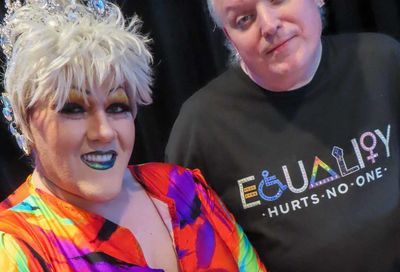Federal Employees One Step Closer to Equal Benefits
Despite Republican attacks, federal domestic partnership bill moves forward in the House
A House committee on Wednesday evening approved a bill to provide equal benefits to gay federal employees with domestic partners, but not without a political slugfest over whether the legislation is an attempt to undermine the Defense of Marriage Act (DOMA).
The Nov. 18 clash came in the House Committee on Oversight and Government Reform, over the Domestic Partnership Benefits and Obligations Act of 2009 (HR 2517). The bill seeks to provide all federal employees with the same benefits whether they are married to a person of the opposite sex or are in a long-term intimate relationship with a person of the same sex. It was sponsored by openly gay Rep. Tammy Baldwin (D-Wisc.) and had the spoken support of President Obama.
All speakers for the bill were Democrats; all speakers against it were Republicans.
Democrats emphasized the bill’s aim to end discrimination against LGBT federal employees by providing them with equal pay for equal work.
Republicans emphasized their concern that the bill is trying to circumvent DOMA and widespread public sentiment as illustrated by 31 states voting to ban same-sex marriage.
The proceedings were web-streamed live on the Committee’s website but are no longer available there.
The debate was a classic discourse between pro and anti-gay forces. Pro-gay legislators talked about fighting discrimination and protecting equal rights. Anti-gay forces talked about opposing special rights and protecting traditional marriage.
Rep. Jim Jordan (R-Ohio), hunched over his papers during much of the proceeding and often turning away whenever an opposing legislator responded to him, offered an amendment to stipulate that nothing in the bill would modify, supersede, or otherwise affect DOMA.
Rep. Edolphus Towns (D-N.Y.), chairman of the House Committee on Oversight and Government Reform, spoke forcefully against the Jordan Amendment, saying ”same-sex domestic partnership laws to do not affect” DOMA.
Rep. Gerald Connolly (D-Va.) opposed it, too, saying the purpose was clearly intended ”to nullify the entirety of the effort here today.”
The amendment eventually failed on a vote of 22 to 12.
Republicans lodged a number of contradictory complaints about the legislation. For instance, Rep. Darrell Issa (R-San Diego) complained that the bill would enable ”any two individuals” to qualify for benefits, while Rep. Jeff Fortenberry (R-Neb.) complained that any two individuals would not be able to qualify.
”Although this legislation purports to stand on a foundation of non-discrimination,” said Fortenberry, ”it appears to diminish the standing of federal employees who may share the same dwelling and collaborate intimately with an immediate or extended family member of the opposite sex in a nonsexual relationship to meet their basic financial needs.”
His example was a nephew caring for an aunt with cancer. Then he continued.
”What about those who are in nurturing relationships neither marked by physical intimacy nor qualifying for married dependent status but share a specialness of bond based on a commitment to duty or to friendship,” said Fortenberry. His example for this was ”a friend helping a friend of the opposite sex if they were unemployed.”
Rep. Jason Chaffetz (R-Utah) repeatedly stated that he was ”standing tall for traditional marriage.” He offered two amendments: one to require the president to certify that the bill does not increase premiums for existing federal employees before the bill can go into effect; the other to require the Government Accountability Office (GAO) to study the impact on premiums.
The first amendment failed. And Rep. Mike Quigley (D-Chicago) amended the latter to have the GAO study the effect of extending benefits to domestic partners on the government’s ability to recruit and retain employees.
In response to GOP complaints that two people of the same sex might pretend to be in a domestic partnership in order to gain benefits, Rep. Steve Lynch (D-Mass.) said: ”I don’t think there’s a whole lot of people out there, given the discrimination we have against gays and lesbians in our society, trying to pretend that they’re gay or that they’re lesbian so they can get favorable treatment. That’s not the reality of today’s world.”
Rep. Eleanor Holmes Norton (D-DC), an African American, also rebuffed such arguments, saying ”I know discrimination when I see it. This is the opposite. This is a civil rights bill.”
Norton noted, with some irony, that some years ago, Republicans refused to allow a domestic partnership bill in Washington, D.C., because the bill attempted to include domestic partners and other family members living together.
Chairman Towns rebutted Republican concerns that the bill would cost too much, noting that only about 15,000 to 30,000 new enrollees are expected to join federal health insurance rolls as a results of the legislation –representing 0.3 percent. But Issa came back claiming that the LGBT community frequently cites a figure of 10 percent for its representation in the population. (In fact, the community hasn’t used a figure like that since the 1970s. More recent scientific surveys, according to gay statistical expert Gary Gates, ”have been very consistent in showing that something like 2-4% of adults identify as LGB.”)
The bill now goes to the floor in the House.
Senators Joe Lieberman (I-Conn.) and Susan Collins (R-Maine) introduced a version of the bill into the Senate.
In a related development, a judge for the 9th Circuit U.S. Court of Appeals ruled Nov. 18 that the federal government violated the constitutional rights of a gay federal attorney when it denied him health coverage for his same-sex spouse. The two men were married in California during a period of five months last year when same-sex couples could obtain marriage licenses.
© 2009 Keen News Service
Support Metro Weekly’s Journalism
These are challenging times for news organizations. And yet it’s crucial we stay active and provide vital resources and information to both our local readers and the world. So won’t you please take a moment and consider supporting Metro Weekly with a membership? For as little as $5 a month, you can help ensure Metro Weekly magazine and MetroWeekly.com remain free, viable resources as we provide the best, most diverse, culturally-resonant LGBTQ coverage in both the D.C. region and around the world. Memberships come with exclusive perks and discounts, your own personal digital delivery of each week’s magazine (and an archive), access to our Member's Lounge when it launches this fall, and exclusive members-only items like Metro Weekly Membership Mugs and Tote Bags! Check out all our membership levels here and please join us today!






















